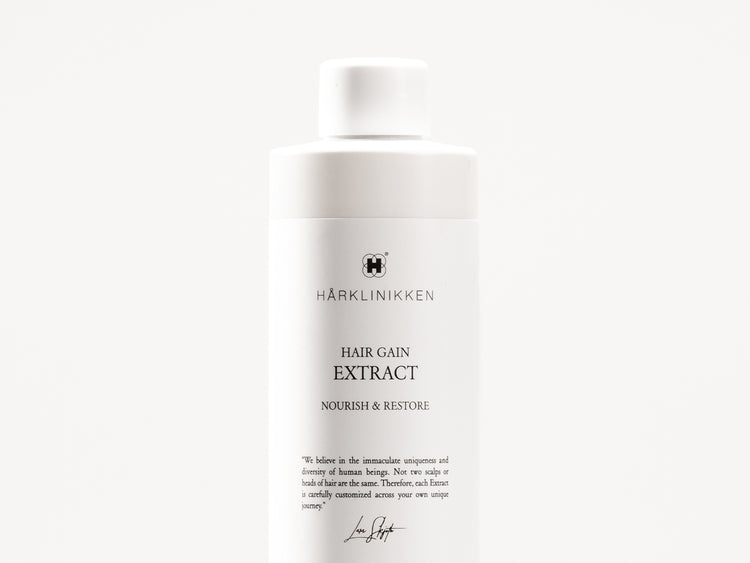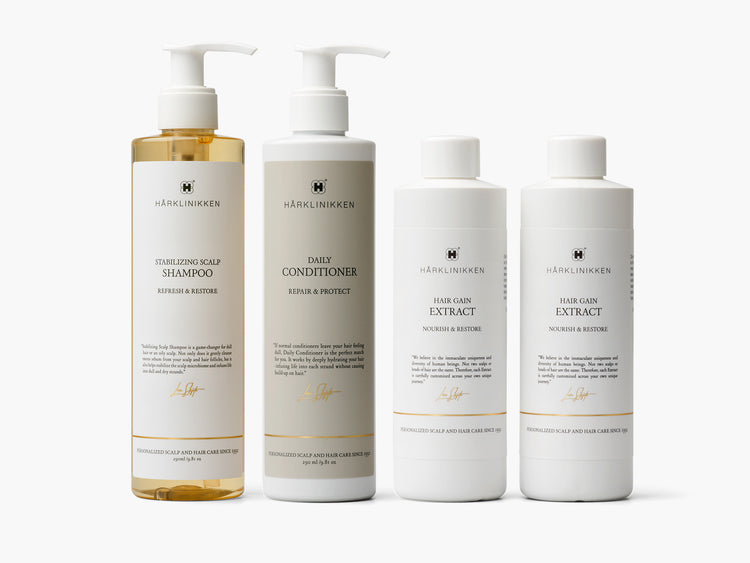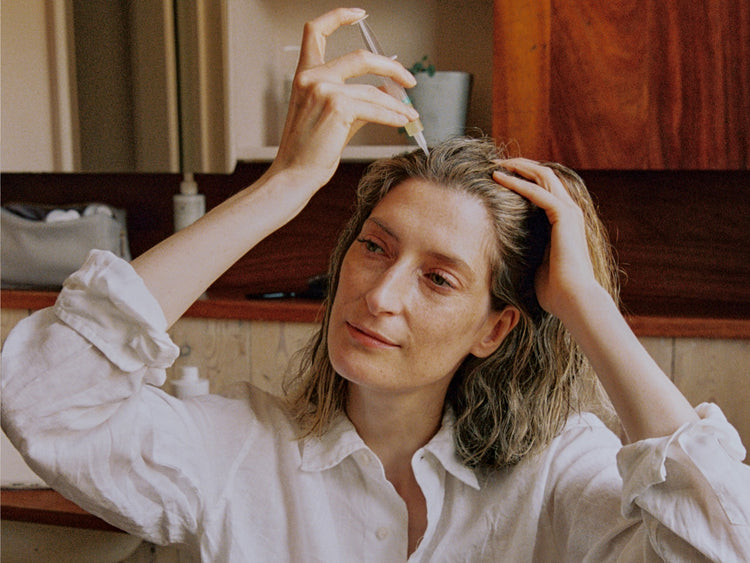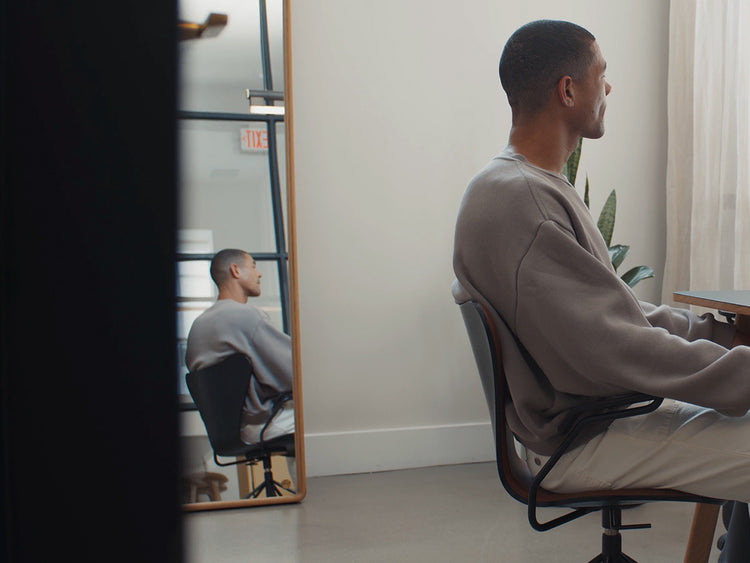Even for individuals who feel equipped and educated when it comes to ageing, there will undoubtedly be unexpected challenges along the way. As a licensed marriage and family therapist and licensed professional counselor, Dr Juliana Hauser intellectually understands the emotional and mental hurdles that come with body changes associated with ageing, hormonal imbalances and menopause, but her own experience with hair thinning surprised even her. A Hårklinikken client and an expert in her field, she spoke with us about self-image, hair loss, ageing, intentional decision-making, body compassion and more.
What is self-image?
Your self-image encompasses personality traits, abilities, physical appearance and overall worth. When feeling uncomfortable or unhappy with your appearance, it’s common to feel a disconnection with your body and your identity – which can lead to a disconnect with others too.
How self-image impacts your relationship with others
When it comes to your relationships with other people, it’s about connection. Dr Hauser says connection “is all about feeling seen, wanted and valued.” But when you don’t feel good about your appearance (whether due to ageing, menopause, skin, weight, hair loss or any other body-related issues), it can make feeling seen, wanted and valued feel impossible. “If it's hard for you to be seen by somebody else, or even for you to see yourself – literally to be seeing your body or to have attention put toward you – if that feels uncomfortable then it's very difficult to feel wanted and to accept being wanted by somebody else. It can be difficult to even put yourself in a position where you might be at risk of being wanted or unwanted.” This discomfort can very easily and quickly lead to “a disconnection and disassociation with desire,” she says.
Of course, this extends far beyond romantic or sexual relationships, and can exist with friends, family, colleagues and even strangers. “It doesn't matter how beautifully and eloquently the compliments are said from somebody else,” Dr Hauser explains. “If we don't feel it ourselves, we can't receive it.”
How self-image impacts your relationship with yourself
There’s a commonly held belief in the realm of self-love to ‘just accept yourself,’ but it’s not that straightforward for a lot of people. “We know that negative self-talk is really damaging to us, and we have scientific evidence to back that up. But so is relentless or unrealistic positivity,” Dr Hauser says. “Studies have shown that practicing body compassion is more powerful if you want to shift your relationship with your body.” That includes your hair, skin, weight, everything. If you’re struggling to feel comfortable in your body or feel shameful about changes that are occurring, go easy on yourself and remember that Dr Hauser believes “trying to obtain blind positivity can be as damaging as experiencing negativity” and to instead practice compassion with yourself.
Dr Hauser suggests thinking of the relationship you have with yourself the same way you would have in a romantic relationship – there’s no one-size-fits-all answer. “We need to also support each other's journey. It’s like relationships. What kind of relationship do you want to have? What do you want your vibe to be? Each relationship will be unique, but what I'd argue we'd all want is for the relationship with ourselves to be supportive and compassionate instead of damaging.”
Dr Hauser’s personal experience with hair loss
Despite seemingly having all the education, experience and skills needed to deal with body changes, Dr Hauser’s experience with her hair thinning was confronting and troubling. "I could not believe what it felt like when I started losing hair,” she says. “I was distressed.” This distress was multi-pronged. “First, I was distressed that it felt like something was out of control and it felt awful to have handfuls of hair coming out,” she says. “But I also didn't know what to do about it. I had access to support if it was another part of my body but no one was talking about hair loss in any of the discussions about body image or body compassion, so it felt shameful. And I do this work – I know ‘better’! I wasn't even aware I was feeling ashamed; I was just keeping it private. Suffering in private."
Like for so many individuals experiencing hair thinning or loss, Dr Hauser went in search of solutions without much understanding of the industry. After plenty of online exploring, she found Hårklinikken. Along with the relief that came with finding a solution, Dr Hauser says the change in herself was profound. "When I found Hårklinikken and started having a positive change in my hair, I started feeling a different level of confidence,” she says. Additionally, Dr Hauser entirely overcame any sense of embarrassment surrounding hair loss. “I loved that I had transitioned to a place of ‘I don't care! This isn't shameful or a vain emotion,” she says. “It’s part of my body, part of how I express myself.” Also like many Hårklinikken clients, Dr Hauser decided to share her story. “Because I thought not enough people were talking about hair loss, I started talking about it. I started talking about how it felt. I started owning the emotions to it, sharing what was working for me and then others started sharing their stories with me. Talking about it – and that helped a lot.”
Making decisions about your body
Dr Hauser’s experience with hair loss illustrates something central to her work, which is agency – the purpose and intention necessary to make decisions for ourselves. As she explains, “We have to be purposeful and intentional about how we feel about our body, how we feel about our relationship with our body, and the decisions we make about our body. The first thing in that process is shedding ourselves from what everyone else says is right and wrong – in the world, in the media, in the beauty industry. That is no small order, but it's the starting point.” To loosen our grip on other people’s opinions means allowing ourselves the permission and freedom to do what we need in order to feel better about who we are. (In moderation, of course.)
This kind of agency can coexist with others (whether their decisions are the same as yours or not) and, even if it leads to unintended consequences, can be wildly successful and satisfying. “If you have made a choice with purpose and intention, it's rare for it to lead to a point that you have to heal from,” Dr Hauser says. “You might pivot if you don't like the consequences, but you don't have to heal from it. If you make a decision with agency, the decision you make matters less than how you make it.” That means indecision or inaction can oftentimes be more detrimental than a decision that doesn’t lead to the exact result you’d intended.
It’s about hair, but also ageing in general
There is a plethora of topics that are difficult to talk about, and while hair loss is one of them, Dr Hauser believes there are even more stigmatised subjects. “Sexuality is a topic that a lot of people are nervous about or feel is taboo. It's really difficult to start the questions or to come get help, but I have seen ageing being harder than sexuality for people to talk about.”
Ageing is something that Dr Hauser talks to all her clients about – no matter how old they are – because it affects everybody to varying degrees throughout life. “The conversations are very similar with people of all ages,” she says. “There's a grieving process that includes the loss of who you were and the loss of who you thought you would be at this point. It’s also the marvel of what you've experienced and who you've become.”
Ageing isn’t just about women or menopause
Dr Hauser feels that men, non-binary and trans individuals are often left out of the conversation about ageing. "We can’t change our culture of ageing if we're only changing it for one gender, which is really predominantly women at this point. We've got to change it for all genders,” she says. “I really wish there was an overarching umbrella term about the hormonal changes that come with age. It should be considered a process. And then there should be individualised terms according to your biological gender, your social gender, and all other aspects.”
People of all genders in their mid-50s, Dr Hauser has found, go through the grieving process when it comes to ageing, but also have a refreshingly optimistic and enthusiastic outlook. "They get to be really hopeful. They care a lot less about what other people think about them,” she explains. “They're living much more of a life of agency than they ever have. They're often very hungry to start learning and want to live on their own terms – not on the terms of other people.”
Four tips from Dr Hauser
If you’re feeling distressed about changes happening to your body, here is some advice:
- Don’t fight it.
"Oftentimes people expend a lot of energy denying things and think that that is going to fix it when it isn't. You need to own it. Some people can do that privately or they can do it with friends, and others will need to seek professional help, but take it seriously. It is not a benign experience to feel disconnected with your body. If you don't own it, it will own you and it will come out in unhealthy ways or will come out in ways that you can't control. Allow those feelings.”
- Do your research.
“Find out what your options for action are. Of course, you have to be a wise consumer considering what you’re reading and seeing but be smart and really educate yourself. A lot of the time, when we're feeling disconnected with our body, it starts with us not knowing what our options are. No matter what choice, if any, you make, at this point is just about having a whole buffet of options for you.”
- Find two older mentors. "One is somebody who is living a life that you're drawn to and the other is somebody who’s doing it a different way. These non-family members who aren’t gatekeepers and will share their experiences and answer your questions. It's not about them telling you what to do, they’re more like an advisor who can tell you what to look out for and validate you on your own journey.”
- Find your community.
"If it’s possible, be part of a community of people or form your own group of those who are filled with agency. Then you will feel like you can really decide for yourself what to do about how you're feeling about your body, and life in general – and be supported in that.”

Unsure where to start?
We only accept candidates who we believe we can help, which is why our online Hair Assessment is the best place to start. Based on your results, you will either qualify for immediate treatment or we will organise a consultation.






